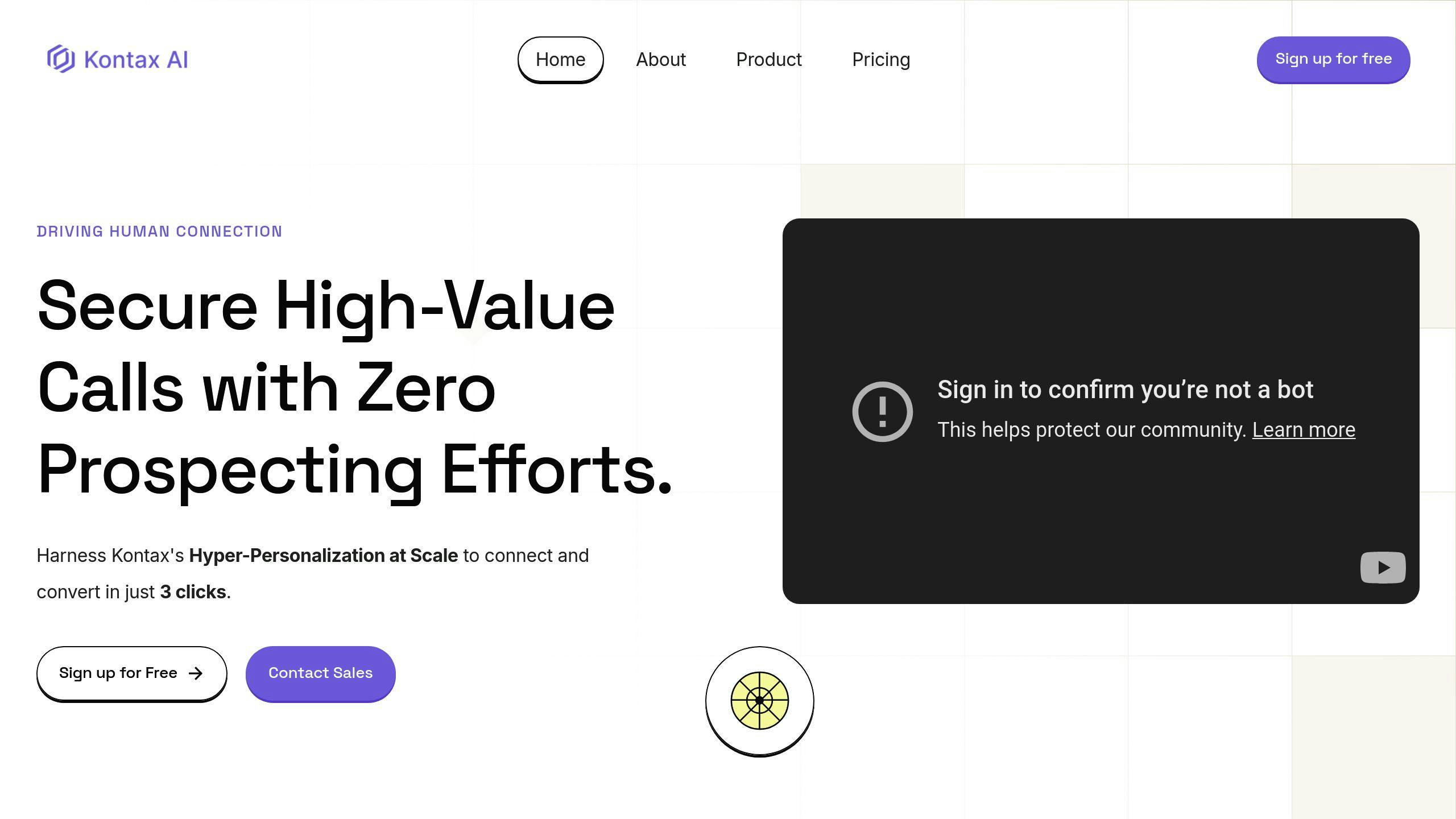Back to Page
Explore how AI enhances lead qualification by improving accuracy, efficiency, and smart routing for sales teams.
AI Prospecting
Sales Prospecting
December 30, 2024

Omer Hochman
Sales Outreach
How to Qualify Sales Leads Using AI: A Step-by-Step Guide
AI-powered lead qualification helps sales teams prioritize leads by analyzing data from CRMs, websites, and social media in real-time. Unlike manual methods, AI ensures consistent, unbiased scoring, scales effortlessly, and provides actionable insights.
Key Benefits of AI in Lead Qualification:
Accuracy: Data-driven scoring eliminates human error.
Efficiency: Processes thousands of leads instantly.
Smart Lead Routing: Assigns leads to the right sales reps.
Real-Time Updates: Adapts to changing customer behaviors.
Quick Steps to Get Started:
Define Your Ideal Customer Profile (ICP): Use AI to find patterns in historical data.
Organize Your Data: Clean and standardize information for better AI accuracy.
Choose the Right AI Tool: Look for features like predictive scoring, CRM integration, and real-time processing.
Build Automated Workflows: Set up rules for lead scoring, follow-ups, and disqualifications.
AI transforms lead qualification into a faster, more precise process, helping you focus on high-value prospects and close more deals.
Understanding AI in Lead Qualification
What is AI Lead Qualification?
AI lead qualification uses machine learning to sift through extensive data from CRMs, websites, and social media, pinpointing promising leads in real-time. By analyzing patterns in past data, AI predicts which leads are most likely to convert, improving its accuracy over time through continuous learning.
Why Use AI for Lead Qualification?
AI brings a range of benefits that enhance the lead qualification process. Let’s break down its key strengths:
Accuracy and Consistency: AI evaluates leads using data-driven criteria, ensuring scoring is free from bias and remains consistent.
Real-Time Analysis: It processes leads instantly, handling large volumes effortlessly as your business grows.
Smart Lead Routing: AI assigns leads to the most suitable sales reps based on expertise or past success, ensuring timely follow-ups.
Actionable Insights: AI provides clarity on why certain leads rank higher, allowing teams to refine their strategies.
"Machine learning plays a crucial role in AI lead qualification by enabling the system to learn from historical data and improve its predictions over time. Machine learning algorithms analyze data to identify patterns and correlations that indicate a lead's quality and readiness to buy, and continuously refine their models to improve accuracy" [1][3].
AI not only processes data faster but also scales beyond what humans can manage. By understanding these capabilities, you can seamlessly integrate AI into your sales workflow. Next, we’ll look at how to set up an AI-powered lead qualification system.
1: Setting Up Your AI Lead Qualification System
Define Your Ideal Customer Profile (ICP)
Creating a clear ICP helps AI tools focus on leads with the highest potential to convert. By analyzing historical customer data, AI identifies patterns that highlight high-value prospects.
Organize Your Data
Well-structured data is critical for AI to provide accurate lead scoring and actionable insights. According to HubSpot, companies with organized data see up to 30% better lead qualification accuracy when using AI tools.
Key steps to prepare your data:
Standardize formats for customer details like job titles and industries.
Remove duplicates and update outdated information for cleaner data.
Tag interactions (emails, calls, downloads, etc.) to help AI detect meaningful patterns.
Keap's AI lead scoring system shows that clean data can boost lead scoring accuracy by as much as 40%.
Align AI with Sales Teams
For AI to work effectively, it must be closely integrated with your sales team. Here’s how to ensure alignment:
Regular Feedback Sessions: Hold monthly meetings where sales teams can share insights on AI-qualified leads.
Performance Metrics: Compare AI predictions with actual sales outcomes to fine-tune lead qualification criteria.
Training Programs: Equip your team with the knowledge they need to make the most of AI insights.
With your data organized and your sales team on board, you're ready to choose the tools that will bring your AI strategy to life.
2: Selecting AI Tools for Lead Qualification
Features to Look for in AI Tools
When choosing AI tools for lead qualification, focus on features that simplify the process and help your sales team work more efficiently. Here's a breakdown of key features and why they matter:
Kontax AI: A Tool in Action

Kontax AI is a platform designed to handle lead qualification efficiently. By automating workflows and integrating directly with CRM systems, it ensures your sales process runs smoothly. It’s packed with features that make it a strong choice for sales teams.
What Kontax AI Offers:
Automated lead qualification
Scaled personalized outreach
Real-time analytics for insights
Built-in objection handling
Kontax AI has been shown to triple reply rates by leveraging AI to refine outreach efforts. Its ability to integrate with existing systems ensures minimal disruption while driving growth.
For the best outcomes, focus on tools that:
Regularly update scoring models based on sales results
Create precise lead lists tailored to your goals
Offer detailed insights into performance metrics [4]
Once you’ve chosen the right tool, the next step is to design workflows that fully utilize your AI system's capabilities.
3: Using AI for Lead Qualification
Build AI-Driven Workflows
To make the most out of AI for lead qualification, you need clear criteria and well-structured automated processes. The goal is to seamlessly integrate AI into your sales operations for better efficiency.
Here’s how to set up an effective AI-driven lead qualification workflow:
1. Define Lead Scoring Criteria
Develop a scoring model that evaluates leads based on multiple data points, including their behavior and demographics.
2. Set Up Automation Rules
Configure your AI system to automatically manage leads based on their scores. For example:
3. Ensure System Integration
Link your AI tool with existing platforms like CRMs to keep data consistent and actionable.
With these workflows in place, let’s explore how companies are already benefiting from AI in lead qualification.
Examples of AI in Practice
Companies like HubSpot demonstrate how AI-powered workflows can transform lead qualification. Their system delivers real-time insights into lead quality and recommends actionable steps for sales teams, simplifying the process [5].
"AI enhances account-based marketing strategies by helping identify and engage high-value accounts through firmographic data, technographic information, and intent signals" [5].
Monitor and Optimize AI Performance
Once your workflows are active, it’s crucial to track their performance to ensure continued success. Focus on these metrics:
To keep improving, update your AI’s training data, fine-tune scoring models, and adjust automation thresholds based on results [1]. This ongoing refinement ensures your lead qualification process remains accurate and efficient.
Related video from YouTube
Conclusion: Improve Lead Qualification with AI
Using AI for lead qualification simplifies sales processes by cutting down on manual work and reducing mistakes, leading to quicker and more precise outcomes. By focusing on key steps - like defining your ideal customer profile (ICP), organizing data, and integrating AI tools - sales teams can streamline their workflows, improve lead accuracy, and scale their efforts effectively [2][3].
Here’s how AI transforms lead qualification:
"AI enhances account-based marketing strategies by helping identify and engage high-value accounts through firmographic data, technographic information, and intent signals" [5].
To make the most of AI in lead qualification, follow these tips:
Start with the Basics: Clearly define your ICP and organize your data. This ensures AI tools can make accurate decisions from the beginning [3].
Monitor Key Metrics: Keep an eye on metrics like accuracy and conversion rates to evaluate AI's performance and fine-tune your approach [1].
Connect Your Systems: Integrate AI tools with your CRM to create a seamless workflow and maintain consistent data across platforms [1][3].
By taking these steps, businesses can introduce AI into their lead qualification process in a way that delivers measurable results. AI offers a real edge, helping sales teams identify and close deals more efficiently.
As technology advances, companies that adopt AI-driven lead qualification will be better equipped to seize valuable opportunities in today’s competitive market.
FAQs
What is the AI tool for lead scoring?
AI lead scoring tools are essential for identifying and prioritizing the best prospects in a lead qualification process. These tools analyze customer data - such as behavior, past interactions, and demographics - to predict which leads are most likely to convert.
For instance, tools like HubSpot's predictive lead scoring integrate directly with CRMs, helping sales teams focus on high-priority leads. Here's how different types of data contribute to AI lead scoring:
AI tools excel at processing large volumes of data quickly, offering real-time and consistent lead prioritization. They identify patterns that might be missed manually, ensuring a more efficient sales process [1][2].
To get the most out of these tools, integrate them with your CRM. This ensures data consistency and enables automated workflows, helping your team focus on leads with the highest potential [3].
What is the cost Kontax AI?
You can use Kontax AI for as low as $11/month for an automated LinkedIn outreach tool, similar to Lemlist but more than 70% cheaper.
Related Blog Posts
Stay up to date with the latest video business news, strategies, and insights
sent straight to your inbox!


